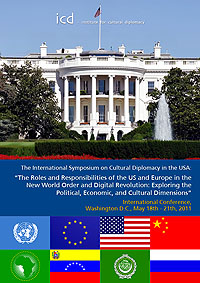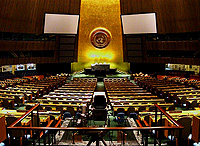The International Symposium on Cultural Diplomacy in the USA 2011
"The Roles and Responsibilities of the US and Europe in a Changing World Order: Evaluating the Political, Economic, and Cultural Dimensions"

Program Agenda
The program will focus in particular on the following issues:
Foreign Policy and Public Diplomacy of the US & Europe in an Age of Digital Revolution and Social Media
The emergence of the information age has had a profound influence on the substance and conduct of international relations and public diplomacy. The rise of the internet and the new forms of interaction and communication this has created a more challenging environment for politicians and diplomats. Whilst policy makers benefit from a more diverse range of media to express and deliver their message, they are confronted with more rigorous analysis of activity, a 24-hour news cycle, and opposition groups better able to mobilize and gather support.- Protest, Revolution and Democracy in Northern Africa and the Middle East
(Focus: Egypt, Tunisia, Libya, Morocco, Iran, Bahrain, Syria, Yemen, Citizen Activism, Citizen Journalism, Traditional Media) - The Social Media and the Internet: Redefining the Distribution of Power between Governments and Citizens
(Focus: The Blogosphere, Twitter, Facebook, YouTube, Online Censorship, Propaganda) - WikiLeaks and Online Whistleblowers: Exposing Corruption or Corrupt Exposure?
(Focus: WikiLeaks, Diplomatic Communication, The Language of Diplomacy, Accountability, International Law, Censorship, Morality) - The Changing International Perception of the US in Diverse Political and Cultural Contexts
(Focus: Nation Branding, Foreign Intervention, Democracy, Free-Market Capitalism, The Future World Leader and the Future of World Leadership?)
The Roles and Responsibilities of the US and Europe in a Changing World Order
The US and the EU remain the world's two largest political and economic powers: Combined, their GDPs account for over 40% of global GDP; they hold a majority of the permanent seats on the UN Security Council and, through NATO, have a combined military defense alliance. In recognition of this political and economic influence, and the close historical and cultural ties between the two regions, the extent to which the international community as a whole is able to meet global challenges is largely dependent on the policies and cooperation of the US and Europe.- America, Europe and the Future of the United Nations in a Globalized World
(Focus: US-UN Relations, UN Security Council reform, Humanitarian Intervention, International Peacekeeping, Democracy Promotion) - Approaches Towards and Relations with Emerging Global Political Players
(Focus: China, India, Brazil, South Africa, Regional Organizations) - International Security Policies: Ensuring Stability in Fragile Regions
(Focus: NATO, the AU, the UN, Afghanistan, Iraq and Central Asia, Iran, Israel/Palestine, Pakistan, Somalia, The Ivory Coast, Libya, Human Trafficking, Slavery) - The US and European Approaches Towards the Global Challenge of Climate Change and Natural Disasters
(Focus: Pollution, Air Travel, Manufacturing, the EU, Emissions Trading, Moral Arguments, China-US Relations, UN Conferences) - The Future of the World Economy and the Impact of US and Europe
(Focus: Energy Policy, Securing the Global Financial System, Global Trade and Business Relations, Free Trade, Fair-Trade, China, Trade Deficits the Relations between Developing Countries and the IMF/the World Bank) - Rethinking National Interests: Global Public Goods and Foreign Policy (Focus: Climate Change and the Environment, Economic Migration, Security, Healthcare)
- Cultural Understanding: Moving Beyond a Clash of Civilizations
(Focus: Religious Tolerance, Immigration and Integration, Islam and Islamism, Christianity and Christian Fundamentalism, Israel/Palestine, International Civil Society, Development and Conflict)
The US, Europe and the Use of Innovative Concepts of Cultural Diplomacy to Build Trust and Strengthen Foreign Relations
The application of cultural diplomacy, which was used widely by both sides during the Cold War, has risen again to the forefront of contemporary foreign policy strategies. Winning "hearts and minds" abroad is now broadly acknowledged as essential to most foreign policy objectives. A changing security environment, globalization and economic interdependence, and religious tension, have all highlighted the value of relations built on dialogue, understanding, and trust.- The Relationship between Culture, International Relations, and Globalization (Focus: The Role of Culture in Global Politics, The Global Battle for Hearts and Minds, Diasporas as Cultural Ambassadors or Political Agitators, Cosmopolitanism, Multiculturalism, The Rise of Global Citizenship, Cultural Relativism and the Concept of Universal Human Rights)
- Innovative Forms of Cultural Diplomacy: The Role of Cultural Diplomacy in Contemporary International Relations
(Focus: Civil Society Initiatives, Non-State Actors, Cooperation on Global Public Goods, America Houses, Rock & Roll Diplomacy, Sports as Cultural Diplomacy, Peace building Initiatives, Art and Music as a Catalyst for Diplomacy) - Cultural Understanding as a Form of Soft Power and its Importance for International Relations
(Focus: Intercultural and Inter-Faith Dialogue, Academic Exchange, Building Understanding and Trust between Peoples and Nations)
Smart and Soft Power in US Foreign Policy
The relationship between hard and soft power is crucial to national governments in the contemporary international environment. The application of one can be seen to undermine the other, and the combination of both, so-called "smart power", requires considerable resources and a thorough understanding of political, economic, and societal contexts. As the US adapts to new global powers, a changing security environment, and new concepts of national interests, achieving a sustainable balance between hard and soft power will be of fundamental importance.- Moving Towards Smart Power: Smart Power in Domestic and International Politics
(Focus: New Power Paradigms, the Evolution and Rise of Civil Society, Innovation and Civil Participation, Power Sharing in Domestic and International Politics, Balancing Soft and Hard Power in Foreign Policy) - Soft and Normative Power: The Role of Attraction in International Politics and Economics
(Focus: Democracy, Legitimacy, International Law, the UN, Human Rights, Domestic Politics) - Managing Relationships with Potential Partners and Competitors
(Focus: Mexico, Latin America, the EU, China, Brazil, India) - Contemporary Strategies to Acquire Soft Power
(Focus: Government to Government, Government to Citizen, and Citizen to Citizen Communications; Economic Attraction, Human Rights, The Attraction of the Free Market, The Impact of Humanitarian Aid, Military and Infrastructural Support, Development Aid, Relief Delegations) - Using Hard Power without Losing Soft Power: When is it Appropriate and Necessary to use Hard Power?
(Focus: Humanitarian Emergencies, Genocide, Human Rights Violations, Dictatorships, Energy Security, Terrorism, Weapons of Mass Destruction, The Use of Hard Power Resources to Produce Soft Power)

























































































